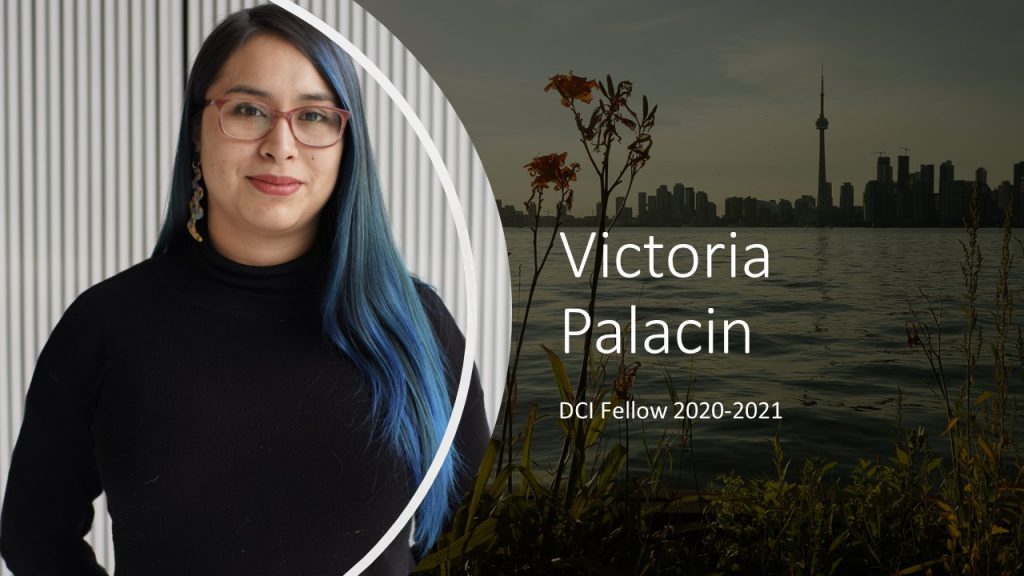We are delighted to announce that the DCI Fellowship for the year 2020-2021 has been awarded to Victoria Palacin!

Please read on for a biography and an overview of the Fellowship project.
Victoria Palacin (@vpalacin) is a computer scientist who researches human-computer interactions. Her work focuses on co-creating technologies and physical data experiences with and for communities. She is interested in how technology can be used to amplify people’s agency and voices in the development of their cities and to improve the balance of powers in society. A Peruvian living in Finland, Victoria is an affiliate scholar at the University of Helsinki and a doctoral candidate at LUT University. Her doctoral thesis explores the links between human values and participation in Digital Citizen Science. She is supervised by Prof. Jari Porras (LUT University) and Dr. Maria Angela Ferrario (Lancaster University).
Victoria has also been a visiting research fellow during 2019-2020 at the MIT Center for Civic Media, where she worked on developing data experiences and de-constructing digital platforms for public participation. Before her doctorate, Victoria completed a master’s degree in the pioneer Erasmus Mundus master on Sustainability and Computation (Pervasive Computing for Sustainable Development). During this programme Victoria developed a deep interest in computational methods to study online participation as a way to build livable, sustainable, and participatory futures. These interests were later pursued during her doctoral studies.
During all these years her work has always been trans-disciplinary, involving areas from arts, design, science, and engineering. The projects Victoria has been part of during her young academic career have always sought to spread joy, democratize knowledge, and create equitable futures. Some of her favorite explorations include Ñawy Harkay (low-cost accessibility glasses to allow handicapped people to use computers by eye movements; Imagine Cup 2011 World Finalist), Ways to die (a satirical app that uses climate change data from NASA to predict the way you will exit this planet due to climate change effects, NASA Space Apps 2014 Finland finalist), Data Moves (explorations on the embodiment of data through human expression for storytelling to overcome data literacy issues), Sensei (participatory interventions to image and create environmental community technologies in rural Finland) and Otro CoVID (an ongoing project to map the practices of online collaboration during the 2020 pandemic).
Victoria has received several recognitions in the last decade for her work as an activist promoting inclusive higher education and equitability projects in the global south. She has been a local, national and regional representative of students and causes with the Erasmus Mundus Association of the European Commission and the IEEE.
Victoria tweets at @vpalacin, and you can read more about her at www.mavipasi.com
Fellowship project: The design of digital pseudo-participation and the role of digital curation ‘in-the-wild’
Participation is key to building an equitable and sustainable future. Yet a lack of agency in decision making and agenda-setting is a growing phenomenon in the design of digital public services. This has motivated Victoria’s current academic projects, which involve: documenting how pseudo-participation takes place in contemporary governance digital platforms and, conceptualizing how community technologies are created in emergent spaces (i.e. pandemic confinement, public and rural spaces).
Digital tools have been proposed as a way to mediate participation, in the design, development of solutions to common issues, with examples ranging from workplace information systems and city planning to environment and social policy issues. However, these tools often embed a lack of agency and infuse pre-set agendas into features that resemble non-participatory degrees of participation such as manipulation, one-way information, placation. Victoria and her colleagues have conceptualized this contemporary phenomenon as digital pseudo-participation by and in design – the configuration of digital artifacts and/or processes that can provide an illusion of participation but lacks supportive processes and affordances to allow meaningful participation to happen.
Given the limitations of pseudo-participatory digital services to address common issues, people have developed crucial abilities to create, use and share digital resources that allow them to create their own livable cities (see, for example, the Environmental Data Governance Initiative). Digital curation “in-the-wild” is pervasive and evolves rapidly, especially in emergency situations such as the Chile protests in 2019 or the COVID-19 emergency. In these environments, a diverse set of actors have turned into curators of digital artifacts, data representations, and interactions. In this context, Victoria’s fellowship will focus on the design of digital pseudo-participation, and the role of digital curation ‘in-the-wild’ creating digital public infrastructures.
Victoria will be collaborating with researchers at the DCI, visiting the DCI and the iSchool, and organizing seminars and workshops virtually and (in 2021, hopefully!) in-situ. We will post announcements of these events soon.
